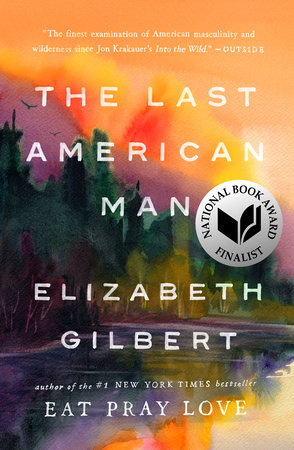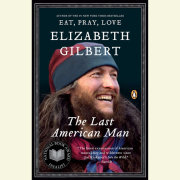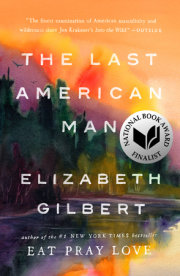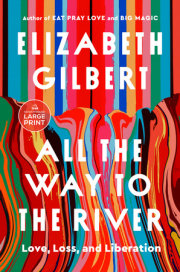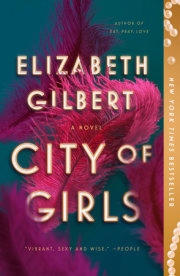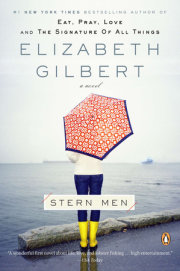CHAPTER ONEWhat a wild life! What a fresh kind of existence!
-Henry Wadsworth Longfellow, considering the possibility of writing an epic poem about the American explorer John Fremont
By the time Eustace Conway was seven years old, he could throw a knife accurately enough to nail a chipmunk to a tree. By the time he was ten, he could hit a running squirrel at fifty feet with a bow and arrow. When he turned twelve, he went out into the woods, alone and empty-handed, built himself a shelter, and survived off the land for a week. When he turned seventeen, he moved out of his family's home altogether and headed into the mountains, where he lived in a teepee of his own design, made fire by rubbing two sticks together, bathed in icy streams, and dressed in the skins of the animals he had hunted and eaten.
This move occurred in 1977, by the way. Which was the same year the film Star Wars was released.
The following year, when he was eighteen, Eustace Conway traveled the Mississippi River in a handmade wooden canoe, battling eddies so fierce, they could suck down a forty-foot tree and not release it to the surface again until a mile downriver. The next year, he set off on the two-thousand-mile Appalachian Trail, walking from Maine to Georgia and surviving almost exclusively on what he hunted and gathered along the way. And in the years that followed, Eustace hiked across the German Alps (in sneakers), kayaked across Alaska, scaled cliffs in New Zealand, and lived with the Navajo of New Mexico. When he was in his mid-twenties, he decided to study a primitive culture more closely in order to learn even more ancient skills. So he flew to Guatemala, got off the plane, and basically started asking, "Where are the primitive people at?" He was pointed toward the jungle, where he hiked for days and days until he found the remotest village of Mayan Indians, many of whom had never before seen a white person. He lived with the Maya for about five months, learning the language, studying the religion, perfecting his weaving skills. But his coolest adventure was probably in 1995, when Eustace got the notion to ride his horse across America. His younger brother, Judson, and a close family friend went with him. It was a mad act of whim. Eustace wasn't sure if it was possible or even legal to ride a horse across America. He just ate a big Christmas dinner with his family, strapped on his gun, hauled out an eighty-year-old U.S. Cavalry saddle (rubbed so thin in places that he could feel the heat of the animal between his legs as he rode), mounted his horse, and headed out. He reckoned that he and his partners could make it to the Pacific by Easter, although everyone he told this to laughed in his face.
The three riders galloped along, burning away nearly fifty miles a day. They ate roadkill deer and squirrel soup. They slept in barns and in the homes of awestruck locals, but when they reached the dry, open West, they fell off their horses every night and slept on the ground where they fell. They were nearly killed by swerving eighteen-wheelers when their horses went wild on a busy interstate bridge one afternoon. They were nearly arrested in Mississippi for not wearing shirts. In San Diego, they picketed their horses along a patch of grass between a mall and an eight-lane highway. They slept there that night and arrived at the Pacific Ocean the next afternoon. Eustace Conway rode his horse right into the surf. It was ten hours before Easter. He had crossed the country in 103 days, setting, while he was at it, a world record.
From coast to coast, Americans of every conceivable background had looked up at Eustace Conway on his horse and said wistfully, "I wish I could do what you're doing." And to every last citizen, Eustace had replied, "You can." But I'm getting ahead of my story here.
Eustace Conway was born in South Carolina in 1961. The Conways lived in a comfortable suburban home in a new neighborhood full of the same, but there was a fine patch of woods, standing right behind their house, that had not yet been cleared for development. It was, in fact, a wild, undisturbed, first-growth forest without so much as a trail cut through it. It was an old world forest, still filled with quicksand and bears. And it was here that Eustace Conway's father-whose name was also Eustace Conway and who knew everything-used to take his young son to teach him how to identify the plants, birds, and mammals of the American South. They would wander together in those woods for hours, looking up into the trees and discussing the shapes of the leaves. So these are Eustace Conway's first memories: the cosmic scope of the woods; the stipple of sunlight slanting through a verdant natural awning; the enlightening voice of the father; the loveliness of the words locust, birch, and tulip poplar; the new intellectual pleasure of study enhanced by the distinct physical sensation of his wobbly toddler's head tilting so far back that he might have toppled over from the effort of looking up so hard at so many trees for such a long time.
As for the rest, and over the years, it was his mother who taught Eustace. She taught him how to camp, bait a hook, build a fire, handle wildlife, weave grasses into rope, and find clay in river bottoms. She taught him how to read books with wonderful titles, like Davy Crockett: Young Adventurer and Wild Wood Wisdom. She taught him to sew buckskin. She taught him how to execute every task with ardent perfection. Eustace Conway's mother was not exactly like the other mothers of the day. She was a little gutsier than the average mom in the American South in the early 1960s. She'd been raised like a boy at a summer camp that her family had owned in the mountains of Asheville, North Carolina. She was an unrepentant tomboy, a proficient horseback rider, and a capable woodsman who, at the age of twenty-two, had sold her silver flute for passage to Alaska, where she lived in a tent by a river with her gun and her dog.
By the time Eustace was five years old, the forest behind his house had been leveled by the real estate market, but the family soon moved to a four-bedroom home in another suburban development. It was in Gastonia, North Carolina, and had its own dense forest standing behind it. Mrs. Conway let Eustace and his young siblings have the run of the woods from the time they could walk-barefoot and shirtless and without supervision-from sunup to sundown, every moment of their childhood, except for those few interruptions for mandatory schooling and churchgoing (because it wasn't as though she were raising savages).
"I suppose I was a bad mother," Mrs. Conway says today, not very convincingly. The other mothers of Gastonia naturally were horrified by this childrearing technique, such as it was. Some of them, alarmed, would call Mrs. Conway on the telephone and say, "You can't let your babies play in those woods! There are poisonous snakes out there!" Thirty years later, Mrs. Conway still finds their concern amusing and adorable. "For heaven's sake!" she says. "My children always knew the difference between poisonous snakes and regular snakes! They did just fine out there."
Briefly, the history of America goes like this: there was a frontier, and then there was no longer a frontier. It all happened rather quickly. There were Indians, then explorers, then settlers, then towns, then cities. Nobody was really paying attention until the moment the wilderness was officially tamed, at which point everybody wanted it back. Within the general spasm of nostalgia that ensued (Buffalo Bill's Wild West Show, Frederic Remington's cowboy paintings) there came a very specific cultural panic, rooted in the question What will become of our boys?
The problem was that, while the classic European coming-of-age story generally featured a provincial boy who moved to the city and was transformed into a refined gentleman, the American tradition had evolved into the opposite. The American boy came of age by leaving civilization and striking out toward the hills. There, he shed his cosmopolitan manners and became a robust and proficient man. Not a gentleman, mind you, but a man.
This was a particular kind of man, this wilderness-bred American. He was no intellectual. He had no interest in study or reflection. He had, as de Tocqueville noticed, "a sort of distaste for what is ancient." Instead, he could sterotypically be found, as the explorer John Fremont described the Ÿber-frontiersman Kit Carson, "mounted on a fine horse, without a saddle and scouring bare-headed over the prairies." Either that, or whipping his mighty ax over his shoulder and casually "throwing cedars and oaks to the ground," as one extremely impressed nineteenth-century foreign visitor observed. In fact, to all the foreign visitors during the eighteenth and nineteenth centuries, the American Man was a virtual tourist attraction in his own right, almost as fascinating as Niagara Falls or that ambitious new railroad system or those exotic Indians. Not everybody was a fan, of course. ("There are perhaps no people, not even excepting the French, who are so vain as the Americans," griped one British observer in 1818. "Every American considers that it's impossible for a foreigner to teach him anything, and that his head contains a perfect encyclopedia.") Still, for better or worse, everyone seemed to agree that this was a new kind of human being and that what defined the American Man more than anything else was his resourcefulness, born out of the challenges of wrenching a New World from virgin wilderness. Unhindered by class restrictions, bureaucracy, or urban squalor, these Americans simply got more done in a single day than anyone had imagined possible. That was the bottom line: nobody could believe how fast these guys worked.
German-born Gottfried Duden, who traveled to the West in 1824 to identify suitable homesteads for German families interested in immigrating to America, reported home in wonder: "In North America, construction jobs which the European countries do not accomplish in centuries are completed in a few years, through the voluntary cooperation of individual citizens." At the time of Duden's visit, for instance, the farmers of Ohio were busy constructing a 230-mile-long canal without the help of a single licensed engineer. Duden saw "beautiful cities" thriving where not even towns had stood two years before. He saw new roads, new bridges, "thousands of new farms," and "a hundred more steamships"-all new, handmade, ingeniously designed, and perfectly operative. Did the American Man need something done? Well, then, he simply made it happen. It was such an attractive idea, this notion of the bold and competent New World citizen. The English travel writer Isabel Bird, famous for her cool and detached prose, seemed scarcely able to keep from exclaiming hubba-hubba as she checked out the rugged men she kept encountering on her trip to America in the 1850s:
"It is impossible to give an idea of the 'Western Men' to anyone who has not seen one at least as specimen . . . tall, handsome, broad-chested, and athletic, with aquiline noses, piercing grey eyes, and brown curling hair and beards. They wore leather jackets, leather smallclothes, large boots with embroidered tops, silver spurs, and caps of scarlet cloth, worked with somewhat tarnished gold thread, doubtless the gifts of some fair ones enamored of the handsome physiognomies and reckless bearing of the hunters. Dullness fled from their presence; they could tell stories, whistle melodies, and sing . . . Blithe, cheerful souls they were, telling racy stories of Western life, chivalrous in the manners and free as the winds."
Look, I wasn't there. It's hard to know how much of this rhetoric was based on truth and how much was the product of an excitable foreign press eager to testify on the Next Big Thing. What I do know is that we, the Americans, bought the hype. We bought it and added it to the already hearty stew of our homegrown self-mythology until we cooked up a perfectly universal notion of who the American Man was and how the American Man was made. He was Pecos Bill. He was Paul Bunyan. He altered the course of rivers with the help of his mighty blue ox, he broke wild horses using rattlesnakes as reins, and he was an omnipotent hero created through revelatory communion with the frontier. Everyone knew that.
So Frederick Jackson Turner wasn't the only person who got nervous when the news came in 1890 from the Census Department that the American frontier was suddenly and officially closed. But he was the first to ask what this closure would mean to future generations. His nervousness spread; the questions expanded. Without the wilderness as proving ground, what would become of our boys?
Why, they might become effete, pampered, decadent.
Lord help us, they might become Europeans.
I first met Eustace Conway in New York City, of all places. This was 1993.
I met Eustace through his brother Judson, who is a cowboy. Judson and I used to work together on a ranch out in the Wyoming Rockies. This was back when I was twenty-two years old, acting as if I were a Western cowgirl-an act that took considerable pretense, given the inconvenient reality that I was actually a former field hockey player from Connecticut. But I was out there in Wyoming because I was seeking an education and an authenticity that I thought could not be found anywhere but on the American frontier, or what remained of it.
I was searching for this American frontier as earnestly as my parents had sought it two decades earlier, when they'd purchased three acres of land in New England and pretended to be pioneers-raising chickens and goats and bees, growing all our food, sewing all our clothing, washing our hair in a rain barrel, and heating our house (and only two rooms of it) with hand-split firewood. My parents gave me and my sister as rugged a nineteenth-century upbringing as they could manage, even though we were living out the Reagan years in one of Connecticut's wealthiest communities and our insular little frontier farmhouse happened to be located on a major highway only a mile away from the country club.
Well, what of it? My sister and I were encouraged to ignore this reality. We picked blackberries in the ditches alongside that highway in our handmade dresses while the cars raced by and the passing eighteen-wheelers shook the ground. We went to school with goat's milk dried on our sleeves from the morning chores. We were taught to disregard the values of the culture that surrounded us and to concentrate instead on this sacred and more ancient American tenet: Resourcefulness Is Next to Godliness.
It is probably not surprising, then, that when I turned twenty-two I decided that I would not be satisfied by going on to graduate school or settling into some respectable career. I had other aspirations. I wanted to learn the boundaries of my own resourcefulness, and these, I believed, I could learn only in a place like Wyoming. I was inspired by the example of my parents and by Walt Whitman's stirring advice to American boys of the nineteenth century: "Ascend no longer from the textbook! Ascend to your own country! Go to the West and the South! Go among men, in the spirit of men! Master horses, become a good marksman and a strong oarsman . . ."
I went to Wyoming, in other words, to make a man of myself.
I loved ranch work. I was a trail cook. I was ridin' horses into the wilderness, I was sittin' around campfires, I was drinkin' and tellin' stories and cussin' and droppin' all my g's and basically puttin' on a classic act of phony authenticity. When strangers in Wyoming asked me where I hailed from, I'd say, "Lubbock, Texas." As long as nobody asked a single follow-up question, I was generally able to pass as an authentic cowgirl.
The other wranglers on the ranch even had an authentic cowgirl nickname for me. They all called me Blaze.
But only because I'd asked 'em to.
I was a complete and thoroughgoing faker. But this fakery, I submit, was merely my right and privilege as a young American citizen. I was following the national ritual. I was no more counterfeit than Teddy Roosevelt had been a century earlier, when he left New York City as a cosseted dandy and headed West to become a robust man. He sent the most self-satisfied and self-conscious letters back home, boasting about his rugged experiences, as well as his macho wardrobe. ("You would be amused to see me," Roosevelt wrote to one Eastern friend, "in my broad sombrero hat, fringed and beaded buckskin shirt, horsehide chaparajos or riding trousers, and cowhide boots, with braided bridle and silver spurs.") I know this letter. I wrote it myself, dozens of times, to dozens of people. ("I bought a pair of rattlesnake boots last week," I wrote to my parents from the ranch in 1991, "and I've beat them to shit already doing chores in the corral, but, hell, that's what they're for.")
I met Judson Conway the first day I came to the ranch. He was the first thing I set eyes on after that long drive up that big Wyoming mountain, and I kind of fell in love with him. I didn't fall in love with Judson like "Let's get married!" I fell in love with him like "Mercy!" Because here was Judson Conway at that moment: slim, handsome, hidden slightly under a cowboy hat, and appealingly dusty. All he had to do was stroll by me with his sexy swagger (classically executed, in the Hollywood manner of Pardon-me-ma'am-but-I-just-came-off-a-long-ride), and I was a believer.
I was attracted to Judson because I was a girl and he was beautiful and I wasn't friggin' blind, but I also recognized in him an immediate commonality. Like me, Judson was twenty-two years old and a complete and thoroughgoing faker. He was no more authentically Western than his new friend Blaze. Nor were we more authentically Western than Frank Brown, the other twenty-two-year-old cowboy working on the ranch. He was a college kid from Massachusetts currently going by the moniker Buck. And then there was our head cowboy Hank, who'd always holler, "Let's pound leather, y'all!" when it was time to ride out, but whose father happened to be the assistant attorney general of Utah. We were all putting on the same show.
But Judson was my favorite, because he enjoyed the show better than anyone. He did have the slight cultural advantage of at least being from the South, so he could drawl. He was so damn cool. Walt Whitman would've loved how Judson was living. He was mastering marksmanship and oarsmanship, but he had also traveled across America in boxcars and hitchhiked back, had kissed girls from everywhere, and had learned to be a great storyteller and a talented hunter. And so lucid a horseman! He'd taught himself tricks like swinging his body up and off his horse while it was running along, and many other diversions that weren't entirely practical for ranch work but were most entertaining. He and I had a ball together two years in a row, out there in Wyoming, and then we went our separate ways. But we stayed in touch. Like a good Civil War soldier, Judson corresponded eloquently and loyally by post. Never called; always wrote. And he had a lot to write about, because this was the excellent life he'd made for himself: he spent his springtimes dove-hunting at home in North Carolina, summers as a fishing guide in Alaska, autumns as an elk-hunting guide in Wyoming, and winters helping tourists catch trophy fish in the Florida Keys.
"Intent on learning how to fish saltwater and in hopes of getting a job on a charter boat," he wrote to me, on his first trip to Florida. "I'm staying with a couple I took horseback riding one day in Wyoming. Got to talking, and here I am . . . Been spending a lot of time in the Everglades National Park, birdwatching and wrestling alligators." "Not making a living," he wrote, on his first trip to Alaska, "just living."
Judson always swore he'd come and see me sometime in New York City, where I had since moved. ("Does the Hudson have fish in it?") But the years passed, and he didn't swing by, and I never quite expected him to. ("Gettin' married, huh?" he finally wrote, after a long letter of mine. "Guess I waited too long to visit . . .") And then one day, years after we'd last spoken in person, he called. This was in itself astonishing. Judson doesn't use telephones, not when there are perfectly good stamps to be had. But the call was urgent. He told me he was flying to New York the very next day, to visit. Just a whim, he said. Just wanted to see what a big city was like, he said. And then he added that his older brother, Eustace, would be coming along, too.
Sure enough, the Conway boys arrived the next morning. They stepped out of a yellow cab right in front of my apartment and made the most outrageous, incongruous sight. There was handsome Judson, looking like a young swain from "Bonanza." And there, right beside him, was his brother, Davy Fuckin' Crockett.
I knew this was Davy Fuckin' Crockett because that's what everyone on the streets of New York City started calling the guy right away.
"Yo, man! It's Davy Fuckin' Crockett!"
"Check out Davy Fuckin' Crockett!"
"King of the wild motherfuckin' frontier!"
Of course, some New Yorkers mistook him for Daniel Fuckin' Boone, but everyone had something to say about this curious visitor, who moved stealthily through the streets of Manhattan, wearing handmade buckskin clothing and carrying an impressive knife on his belt.
Davy Fuckin' Crockett.
So that's how I met Eustace Conway.
Over the next two days, against the unlikely backdrop of New York City, I heard all about Eustace Conway's life. One night, Judson and Eustace and I went drinking in a lowdown bar in the East Village, and while Judson kept busy dancing with all the pretty girls and telling thrilling stories of life on the range, Eustace sat in a corner with me and quietly explained how he had been living for the last seventeen years in a teepee, hidden away in the Southern Appalachian Mountains of North Carolina. He called his home Turtle Island, named for the Native American creationist legend of the sturdy turtle who carries the entire weight of the earth on his back. Eustace told me he owned a thousand acres of land back there in the woods-a perfectly contained and unspoiled basin, with a protected watershed.
It seemed curious to me that somebody who eats possum and wipes his butt with leaves could have managed to acquire a thousand acres of pristine wilderness. But Eustace Conway was, as I would discover, a most cunning man. He had amassed that property slowly and over time with money he made by going into the local school systems and talking to riveted schoolchildren about eating possum and wiping one's butt with leaves. Land, he declared, was his only major expense in life. Everything else he needed he could make, build, grow, or kill. He hunted for his own food, drank water from the ground, made his own clothing . . .
Eustace told me that people tended to romanticize his lifestyle. Because when people first ask him what he does for a living, he invariably replies, "I live in the woods." Then people get all dreamy and say, "Ah! The woods! The woods! I love the woods!" as if Eustace spends his days sipping the dew off clover blossoms. But that's not what living in the woods means to Eustace Conway.
Some years ago, for instance, out hunting for his winter deer, he came upon a gorgeous eight-point buck grazing through the brush. He shot. The buck went down. Not knowing if he had killed the animal, he waited and waited to see whether it would struggle up from where it had fallen and try to run. There was no movement. Slowly, quietly, Eustace crept toward the spot where the animal had gone down and found the massive buck, lying on its side, breathing a thin, red vapor of blood through its nose. The animal's eyes were moving; it was alive.
"Get up, brother!" Eustace shouted. "Get up and I'll finish you off!"
The animal didn't move. Eustace hated to see it lying there, alive and injured, but he also hated to blow off its beautiful head at point-blank range, so he took his knife from his belt and stabbed into the buck's jugular vein. Up came the buck, very much alive, whipping its rack of antlers. Eustace clung to the antlers, still holding his knife, and the two began a wrestling match, thrashing through the brush, rolling down the hill, the buck lunging, Eustace trying to deflect its heavy antlers into trees and rocks. Finally, he let go with one hand and sliced his knife completely across the buck's neck, gashing open veins, arteries, and windpipe. But the buck kept fighting, until Eustace ground its face into the dirt, kneeling on its head and suffocating the dying creature. And then he plunged his hands into the animal's neck and smeared the blood all over his own face, weeping and laughing and offering up an ecstatic prayer of thanksgiving to the universe for the magnificent phenomenon of this creature who had so valiantly sacrificed its life to sustain his own. That's what living in the woods means to Eustace Conway.
The morning after our conversation in the bar, I took the Conway brothers on a walk through Tompkins Square Park. There, I lost Eustace. I couldn't find him anywhere, and I got worried, concerned that he was out of his environment and therefore helpless and vulnerable. But when I found him, he was in pleasant conversation with the scariest posse of drug dealers you'd ever want to meet. They had offered Eustace Conway crack, which he had politely declined, but he was engaging with them, nonetheless, about other issues. "Yo, man," the drug dealers were asking as I arrived, "where'd you buy that dope shirt?" Eustace explained to the drug dealers that he had not, in fact, bought the shirt; he had made it. Out of a deer. He described exactly how he'd shot the deer with a black powder musket, skinned the deer ("with this very knife!"), softened the hide with the deer's own brains, and then sewed the shirt together, using strands of sinew taken from alongside the deer's spine. He told the drug dealers that it wasn't such a difficult process, and that they could do it, too. And if they came to visit him in his mountain home of Turtle Island, he'd teach them all sorts of marvelous ways to live off nature. I said, "Eustace, we gotta go."
The drug dealers shook his hand and said, "Damn, Hustice. You something else."
But this is how Eustace interacts with all the world all the time-taking any opportunity to teach people about nature. Which is to say that Eustace is not merely a hermit or a hippie or even a survivalist. He does not live in the woods because he's hiding from us, or because he's growing excellent weed, or because he's storing guns for the imminent race war. He lives in the woods because he belongs there. Moreover, he tries to get other people to move into the woods with him, because he believes that is his particular calling-nothing less than to save our nation's collective soul by reintroducing Americans to the concept of revelatory communion with the frontier. Which is to say that Eustace Conway believes that he is a Man of Destiny.
Eustace created Turtle Island-the thousand-acre perfect cosmos of his own design-as the ultimate teaching facility, a university-in-the-raw, a wild monastery. Because, after years of studying primitive societies and after countless experiences of personal transformation within the wilderness, Eustace has formed a mighty dogma. He is convinced that the only way modern America can begin to reverse its inherent corruption and greed and malaise is by feeling the rapture that comes from face-to-face encounters with what he calls "the high art and godliness of nature."
It is his belief that we Americans, through our constant striving for convenience, are eradicating the raucous and edifying beauty of our true environment and replacing that beauty with a safe but completely faux "environment." What Eustace sees is a society steadily undoing itself, it might be argued, by its own over-resourcefulness. Clever, ambitious, and always in search of greater efficiency, we Americans have, in two short centuries, created a world of push-button, round-the-clock comfort for ourselves. The basic needs of humanity-food, clothing, shelter, entertainment, transportation, and even sexual pleasure-no longer need to be personally labored for or ritualized or even understood. All these things are available to us now for mere cash. Or credit. Which means that nobody needs to know how to do anything anymore, except the one narrow skill that will earn enough money to pay for the conveniences and services of modern living.
But in replacing every challenge with a shortcut we seem to have lost something, and Eustace isn't the only person feeling that loss. We are an increasingly depressed and anxious people-and not for nothing. Arguably, all these modern conveniences have been adopted to save us time. But time for what? Having created a system that tends to our every need without causing us undue exertion or labor, we can now fill these hours with . . . ?
Well, for one thing, television-loads of it, hours of it, days and weeks and months of it in every American's lifetime. Also, work. Americans spend more and more hours at their jobs every year; in almost every household both parents (if there are two parents) must work full-time outside the home to pay for all these goods and services. Which means a lot of commuting. Which means a lot of stress. Less connection to family and community. Fast-food meals eaten in cars on the way to and from work. Poorer health all the time. (America is certainly the fattest and most inactive society in history, and we're packing on more pounds every year. We seem to have the same disregard for our bodies as we do for our our other natural resources; if a vital organ breaks down, after all, we always believe we can just buy a new one. Somebody else will take care of it. Same way we believe that somebody else will plant another forest someday if we use this one up. That is, if we even notice that we're using it up.)
There's an arrogance to such an attitude, but-more than that-there's a profound alienation. We have fallen out of rhythm. It's this simple. If we don't cultivate our own food supply anymore, do we need to pay attention to the idea of, say, seasons? Is there any difference between winter and summer if we can eat strawberries every day? If we can keep the temperature of our house set at a comfortable 70 degrees all year, do we need to notice that fall is coming? Do we have to prepare for that? Respect that? Much less contemplate what it means for our own mortality that things die in nature every autumn? And when spring does come round again, do we need to notice that rebirth? Do we need to take a moment and maybe thank anybody for that? Celebrate it? If we never leave our house except to drive to work, do we need to be even remotely aware of this powerful, humbling, extraordinary, and eternal life force that surges and ebbs around us all the time?
Apparently not. Because we seem to have stopped paying attention. Or this is what Eustace Conway perceives when he looks around America. He sees a people who have fallen out of step with the natural cycles that have defined humanity's existence and culture for millennia. Having lost that vital connection with nature, the nation is in danger of losing its humanity. We are not alien visitors to this planet, after all, but natural residents and relatives of every living entity here. This earth is where we came from and where we'll all end up when we die, and, during the interim, it is our home. And there's no way we can ever hope to understand ourselves if we don't at least marginally understand our home. That is the understanding we need to put our lives in some bigger metaphysical context.
Instead, Eustace sees a chilling sight-a citizenry so removed from the rhythms of nature that we march through our lives as mere sleepwalkers, blinded, deafened, and senseless. Robotically existing in sterilized surroundings that numb the mind, weaken the body, and atrophy the soul. But Eustace believes we can get our humanity back. When we contemplate the venerable age of a mountain, we get it. When we observe the superb order of water and sunlight, we get it. When we experience firsthand the brutal poetry of the food chain, we get it. When we are mindful of every nuance of our natural world, we finally get the picture: that we are each given only one dazzling moment of life here on Earth, and we must stand before that reality both humbled and elevated, subject to every law of our universe and grateful for our brief but intrinsic participation within it. Granted, this is not a radical concept. Every environmentalist in the world operates on a philosophy based on these same hypotheses. But what sets Eustace Conway apart from every other environmentalist is the peculiar confidence he's had since earliest childhood that it is his personal destiny to snap his countrymen out of their sleepwalk. He has always believed that he alone has this power and this responsibility, that he was to be the vessel of change. One man, one vision.
And this was his precise vision-that, one by one, Americans would come to his mystical utopia in the woods. There, under his guidance, they would shed the frailty, ignorance, and pettiness brought about by their contemporary upbringing. Using his charisma as a lure, he would lead people back into the wilderness, uncoil their blindfolds, point them toward the stunning vista of the unspoiled frontier, and say, "Behold!" Then he would stand back and watch the awakening.
Eustace always envisioned groups of children coming to participate in primitive summer camps, but he would also welcome adults-apprentices-who, for extended periods of time, would seriously study a natural way of life under his leadership. Of course he knows it's impossible to drag every single American into the woods with him, which is why he is also committed to going out into the world with his message and delivering the woods directly to the people himself-carrying the very smell of the wilderness in his hair and on his skin and within his words. He would preach and teach his doctrine in every school, at every state fair, in every mall and parking lot and gas station he could find. He would passionately speak to any businessman, baby-sitter, housewife, hooker, millionaire, and crackhead in America.
With Eustace's energy and through his example-he has always been certain of it-Americans would gradually be transformed. They would grow and learn and once again be strong and resourceful. Then they would leave Eustace's side and disseminate their newfound knowledge among their brethren. In this evangelical manner, Eustace Conway's vision of perfect concordance with nature would spread and spread across families, towns, counties, and states until we would all be living like Eustace-growing our food, fabricating our clothes, making fire with two sticks, and recognizing our blessed humanity. Thus both our grand nation and our sacred planet would be saved. That was his plan, anyway.
Audacious? Sure. Still, there is something about the guy . . .
Eustace is not easily dismissed. As his brother Judson would attest in awe, and as I later came to witness in person, Eustace's skills in the wilderness are truly legion. He is wildly competent. He is physically and intellectually predestined to acquire proficiency. He has perfect eyesight, perfect hearing, perfect balance, perfect reflexes, and perfect focus. He has long muscles on a light but strongly constructed frame, like a natural middle-distance runner. His body can do anything he asks of it. His mind, too. He has to be exposed to an idea or shown a process only once to get it right, to lock it in, and immediately begin improving on its principles. He pays closer attention to his surroundings than anyone I've ever seen. His mind operates, as Henry Adams wrote of the minds of the earliest American settlers, like "a mere cutting instrument, practical, economical, sharp, and direct."
And that kind of mind makes for a hard honesty. So that when I once asked him, "Is there anything you can't do?" Eustace replied, "Well, I've never found anything to be particularly difficult." In other words, he's got the self-assurance to back up his conviction that he can change the world. That, in addition to the unshakable will and airtight world view of a natural-born reformer. And he's got charisma, too, which he unleashes brazenly in every interaction he has with anyone.
I first visited Eustace at Turtle Island back in 1995. Midway through my stay, Eustace had to leave the mountain, and I went with him. He had to leave the woods, as he often does, to teach about the woods, to make some money and spread the gospel. So we drove across North Carolina to a small summer camp that specialized in environmental education. A group of teenagers skulked into the camp's dining room for the evening's event, and to me they all looked like jerks-loud, disrespectful, shoving, shrieking, laughing. Eustace was supposed to get these kids excited about nature.
I thought, This is not gonna end well.
Eustace, wearing jeans and a plaid shirt, not buckskin, walked across the stage toward the microphone. Around his neck hung two large coyote teeth. On his belt, the knife. The shoving and shrieking and laughing continued.
Eustace, thin and serious, stood at the microphone with his hands in his pockets. After a long moment, he said, "I am a quiet-spoken man, so I am going to have to speak quietly tonight."
The shoving and shrieking and laughing stopped. The jerky teenagers stared at Eustace Conway, riveted. Just like that-dead silence. I swear it. It was like goddamn To Sir with Love.
"I moved into the woods when I was seventeen years old," Eustace began. "Not much older than you are today . . ." And he talked about his life. Those kids were so transfixed, you could have operated on them and they wouldn't have noticed. Eustace told them about wilderness survival and his adventures, but he also gave his speech about the difference between the world of boxes and the world of circles.
"I live," Eustace said, "in nature, where everything is connected, circular. The seasons are circular. The planet is circular, and so is its passage around the sun. The course of water over the earth is circular, coming down from the sky and circulating through the world to spread life and then evaporating up again. I live in a circular teepee and I build my fire in a circle, and when my loved ones visit me, we sit in a circle and talk. The life cycles of plants and animals are circular. I live outside where I can see this. The ancient people understood that our world is a circle, but we modern people have lost sight of that. I don't live inside buildings, because buildings are dead places where nothing grows, where water doesn't flow, and where life stops. I don't want to live in a dead place. People say that I don't live in the real world, but it's modern Americans who live in a fake world, because they've stepped outside the natural circle of life.
"I saw the circle of life most clearly when I was riding my horse across America and I came across the body of a coyote that had recently died. The animal was mummified from the desert heat, but all around it, in a lush circle, was a small band of fresh green grass. The earth was borrowing the nutrients from the animal and regenerating itself. This wasn't about death, I realized; this was about eternal life. I took the teeth from that coyote and made myself this necklace right here, which always circles my neck, so I'd never forget that lesson.
"Do people live in circles today? No. They live in boxes. They wake up every morning in the box of their bedroom because a box next to them started making beeping noises to tell them it was time to get up. They eat their breakfast out of a box and then they throw that box away into another box. Then they leave the box where they live and get into a box with wheels and drive to work, which is just another big box broken up into lots of little cubicle boxes where a bunch of people spend their days sitting and staring at the computer boxes in front of them. When the day is over, everyone gets into the box with wheels again and goes home to their house boxes and spends the evening staring at the television boxes for entertainment. They get their music from a box, they get their food from a box, they keep their clothing in a box, they live their lives in a box! Does that sound like anybody you know?"
By now the kids were laughing and applauding.
"Break out of the box!" Eustace said. "You don't have to live like this because people tell you it's the only way. You're not handcuffed to your culture! This is not the way humanity lived for thousands and thousands of years, and it is not the only way you can live today!"
Another hour of this, then uncontained applause, like at a revival meeting. After the talk, Eustace sat on the edge of the stage, drinking from the glass jug filled with fresh Turtle Island spring water that he carries with him everywhere. The teenagers approached reverently, awed, as the camp director gave Eustace an enthusiastic handshake and a discreetly enveloped generous check. The teenagers gathered around more closely. The toughest, baddest-ass gangsta boy of them all came to stand right beside Eustace. He put his fist on his heart and announced, with real solemnity, "You rule, man. You da bomb." Eustace threw back his head and laughed. The other campers lined up to shake his hand and then detonated with questions.
"Could you make fire right now if you had to?"
"Yes."
"If someone dropped you naked into the middle of Alaska, could you survive?"
"I suppose so. But it'd be a lot easier if I had a knife."
"Were you scared when you first moved into the woods?"
"No. The civilized world is much scarier than the woods."
"Were your parents mad at you when you moved into the woods?"
"My father didn't know why I'd want to leave a comfortable modern house, but my mother understood."
"Do you ever get sick?"
"Rarely."
"Do you ever go to the doctor?"
"Never."
"Do you know how to drive a car?"
"How do you think I got here tonight?"
"Do you use any modern tools?"
"I use chain saws all the time to take care of my land. I use telephones. And plastic buckets. My God, but plastic buckets are great! I've made plenty of my own baskets and containers out of tree bark and grasses-I mean, I know how to do it and I've used those primitive means of hauling water around lots of time-but I tell you, there's nothing like a plastic bucket to get the job done faster. Wow! Plastic buckets! Glorious! I love 'em!"
"Do you have a toothbrush?"
"Not at the moment."
"Do you have a hairbrush?"
"I used to have a porcupine hairbrush. I don't have it anymore, though."
"What's a porcupine hairbrush?"
"A hairbrush made out of porcupine bristles."
"Where'd you get that?"
"A porcupine saved my life once when I was hiking on the Appalachian Trail, so I made the hairbrush out of its bristles, to honor it."
"How could a porcupine save your life?"
"By giving me something to eat when I was starving to death."
Here, there was an extended silence, as the kids tried to figure that one out. Then they all kind of said, "Ohhh . . ." at the same time, and the questioning continued.
"Why were you starving to death?"
"Because there wasn't any food."
"Why wasn't there any food?"
"Because it was winter."
"What's the longest you've ever gone without eating?"
"Probably the two weeks before I killed that porcupine."
"Can you show us your porcupine hairbrush?"
"I don't have it anymore. I brought it to a demonstration like this one, to show it to some kids your age, and somebody stole it. Can you imagine how sad that made me feel?"
"Do you have a gun?"
"I have several guns."
"Have you ever killed a person?"
"No."
"Are you married?"
"No."
"Why not?"
"I guess I haven't found the right woman yet."
"Do you wish you were married?"
"More than anything in the world."
"Do you ever get lonely out there in the woods?"
Eustace hesitated, smiled wistfully. "Only in the evenings."
Later that night, when we were alone, Eustace told me how heartbroken he gets whenever he spends time around modern American teenagers. Yes, he can communicate with them, but people never understand that it rips him up inside to see how ignorant the kids are, how undisciplined in their personal interactions and how disrespectful of their elders, how consumed they are by material desire and how helplessly incompetent in a way that you would never see with, say, Amish children.
But I wasn't listening carefully to Eustace's lament, because I had another question on my mind. "Hey, about what happened there tonight. Do you get that kind of response everywhere you speak?"
"Yes."
"From all age groups; from all backgrounds?"
"Yes."
I thought this over. "So tell me specifically. Why do you think these particular teenagers were so hypnotized by you tonight?"
Eustace's reply was so immediate, so uncompromising, and so coldly delivered that it sent a quick little chill right through me.
"Because," he said, "they recognized right away that I was a real person. And they've probably never met one before."
Copyright © 2003 by Elizabeth Gilbert. All rights reserved. No part of this excerpt may be reproduced or reprinted without permission in writing from the publisher.

